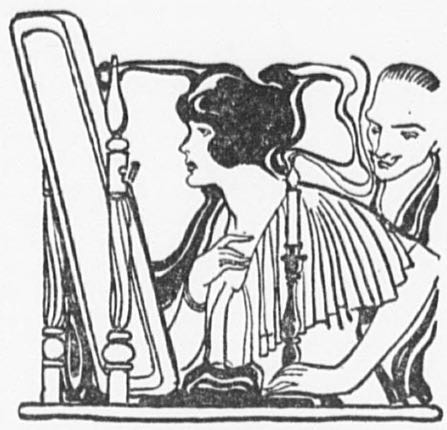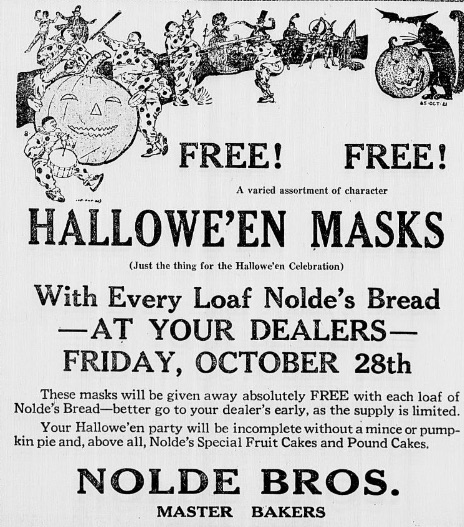
In this article from 1895, the list is that American Halloween customs are very similar to those in Scotland and Ireland. Several distinct Halloween divinations are also given, as well as the pranks associated with Halloween night.

Tis Fairies Night
All Halloween, When To Your Sight May Be, I Ween
A Scotch writer who contributed an article to an American newspaper about Halloween last year declared himself “very much impressed by the almost universal observance of Halloween and its old customs in America.” He added that the forms most taken by the observance of the night there were, and equally to his interest, rather Scotch-Irish than English. Farther on he says that “Halloween has always been and still is the feast of the year, when gentle and simple meet and enjoy themselves together, irrespective of social barrier and caste, so rigorously observed on other occasions.”
This view of Halloween will perhaps be entirely new to a majority of those who read this writing. Halloween is observed in the United States, to be sure, and perhaps in some parts of the country with some of the same superstition that marks its observance among those who dwell on the British isles, but this is rarely the fact among those of the “old time American stock.” This is especially true of those descended from the Puritans. Those sturdy old iconoclasts cast out all sorts of belief regarding saints’ days and pagan festivals, including even Christmas and the Eastertide, in their prohibition of celebrations that savored of either the Roman church of the Druids. The observance of Halloween is a mixture of both, and I have no doubt that there are many thousands in the United States, some of whom will read these words, who were in as dense ignorance of Halloween in their childhood as was a business man of one of our largest cities with whom I conversed the other day.
“I never heard of Halloween at all when I was a boy,” said this man. “I never heard of Easter either until I was 17 or 18. Full knowledge of both did not come to me till I went away to school with money I had earned working in the hayfield and the apple orchard, and then I read their history in the Book of Days. But I knew all about Pass (I used to spell it Poss) and cabbage night. I used to hide eggs in the haymow for days, waiting for the first, and the standing cabbages and the swinging gates of the neighbors used to suffer on the second, I tell you.”
Cabbage night! That’s the title the American boy applies to Halloween. And a right lusty, sturdy savage the American boy is like to be on that night. It must be confessed that the joys of cabbage night, its breathless exertions and running here and there in the darkness, its puling of bells and knocking at doors, its lifting and lugging of gates, its stretching of ropes across paths to trip the unwary, all seem rather flat and silly to the man whose hair is getting gray and who is beginning to be fat or rheumatic or perhaps both. But they weren’t flat and silly some 20 or 30 years ago, were they, old fellow? Do you remember what fun you have stealthily tying two cabbages to Deacon Ellis’ front door knob on cabbage night in 1867 or 1868? How you then knocked at the door and dodged behind the big cherry tree in the yard where Tom Waters was hidden before you? How you then saw the young theological student who was “setting up” with the deacon’s pretty niece, when he opened the door? How he was so angry when he saw the joke that he began to say something that sounded very much like a “big, big D?” How you snickered so loud that he heard you, and darting out into the darkness caught you both and dragged you into the parlor, where he stood you, nearly helpless with mortification, before his sweetheart, preached you a little sermon, smiling the while, which sounded very funny to the young lady, but very serious to you? And how at the windup he confessed that he had himself done such things when he was a boy, but thought them rude and suggested that in the future you spend Halloween going about restoring unhinged gates to their own and the commission of other similar good deeds?
If that reminiscence be not one of yours, then one somewhat similar probably is unless you were a city boy, as I was not. I suppose there is no doubt that town born lads have quite as much fun in their weak way and manner as country lads, but I must confess I have never been able to understand how.
It is not putting it inaccurately, I imagine, to say that Halloween, observed according to the methods that are time honored across the ocean, is a new institution, comparatively speaking at least, in America. It was brought here by settlers who came latter than the Puritans, by immigrants who came to better their condition and not for liberty of conscience. In some sections where the population is largely made up of this latter element the old English, Scotch and Irish legends undoubtedly obtain, yet it is extremely doubtful if there is one-tenth of the Halloween superstition anywhere in the United States that exists in the mother country unless it is among the [African Americans] of the south, where it has been completely assimilated in the system of superstitions held by the children of Africa.

A sort of half belief in Halloween superstition has been widely disseminated by the boarding schools of the land, and it is safe to assume that there is far more of Halloween observance among the children and young folks of the rich and well to do than among those whose parents work for wages throughout the land. It is quite customary nowadays for parents to plan Halloween parties for their children, at which many of the sports of the season are entered into.
Bobbing for apples, throwing apple peelings over one’s shoulder to see what initials the peelings will form, pouring melted lead into water for a similar purpose and the like are favorite diversions at these little parties. As diversions they are harmless, but in all seriousness the inculcation of superstitious at Halloween, or any other time, for that matter, should be avoided, for the human creature is desperately inclined to be superstitious, no matter how modern, and there is nothing more torturing in life than to be a victim of some belief in the significance of omens and signs and presentiments, even if the victim knows in his inmost heart that there is nothing at all to justify such belief.
As a study the folklore of Halloween is most interesting. The origin of the observance is unmistakably Druidical, and, although the date was shifted to that of All Souls’ night when Christianity usurped heathenism among the Teutons, the Anglo-Saxons and the Celts, there is nothing about its legends and ceremonies that does no savor of the pagan, Pulling the nail (or cabbage) to find if one’s spouse to be will be stout or lean is one, and from this no doubt came the hilarious phantasies of the American cabbage night. Hazel nuts and chestnuts play an important part in English Halloween observances. The poet Gray tells of this most delightfully in these lines:
Two hazel nuts I threw into the flame,
And to each nut I gave a sweetheart’s name.
This with the loudest bounce me sore amazed,
That in a flame of brightest color blazed.
As blazes nut so may thy passion grow,
For twas thine own that did so brightly glow.
In the old days it was believed that witches did travel abundantly on Halloween. The fairies, too, did then disport themselves most friskily, and spells then worked that worked no other night. The burning of bonfires was general in Wales and Scotland on Halloween, and lads and maybe lasses, too, then went out masked and dressed in garments of quaint design.
There were also many games on Halloween in other times of which nothing is preserved, save in tradition. Some of these games were such as would not be admissible now, for the refinement of those old days was much less than that of today, no matter how they may have excelled the present in other directions. Those games which had for their object the discovery of a future husband’s or wife’s identity were naturally most popular. Here is a recipe for securing an answer to the question supposed to be most important to every girl. It is from an ancient publication, entitled “The True Fortune Teller.”
“To know whether a woman will have the man she wishes, get two lemon peels. Wear them all day, one in each pocket. At night rub the four posts of the bedstead with them. If she is to succeed, the person will appear in her sleep and present her with a couple of lemons. If not, there is no hope.”
Here is one from the latitude of Chicago. It is especially adapted to city observance, but it is not warranted: Fill your mouth with salt and sun around the block, when your true love will of surety show himself.
Eva Lovett has put this one into rhyme. It is an old favorite with all Halloween devotees:
At midnight lone hempseed is thrown
(The peeping elves can see).
“I sow hempseed, my love, indeed.
Come garner after me!”
Source: The Hawaiian Gazette. Newspaper. November 29, 1895.

